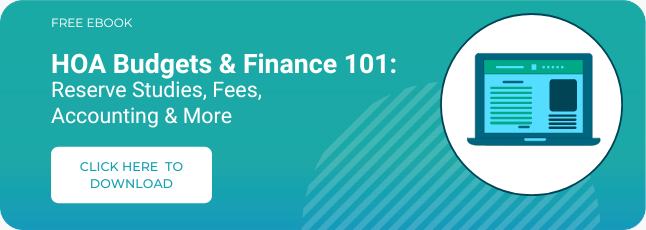Finance is a common concern for HOA residents. While it is often difficult to get all members to agree in a community, avoiding an HOA special assessment is something everyone aims for. HOA members pay regular fees to cover common expenses. However, when unforeseen events happen the board of directors may levy a special assessment to cover extra costs.
Read on to discover what an HOA special assessment is and what the HOA board and residents can do to avoid being in this situation.
What is an HOA special assessment?
Normally, in homeowners associations (HOAs) members have to pay regular HOA fees. Residents pay these dues usually on a monthly, quarterly, or annually basis. These fees cover the maintenance costs of the common areas, such as maintaining sidewalks, landscaping, and amenities.
How much these fees are varies from association to association. This often depends on the size of the property and the number of amenities available. For example, if an HOA has multiple amenities such as a pool, park, or an HOA clubhouse, the fees will automatically be higher, as maintenance is higher.
When the money collected is not enough to cover all expenses, then the board of directors can levy an HOA special assessment. This means that all residents will have to pay an extra amount on top of their regular payments.
Obviously, this is a situation that every member of the community dreads. No one likes paying more than they should. This is why this topic is often a source of arguments within a community.
Several factors lead to special assessments. Let’s find out what these causes are and how to avoid them.
What leads to an HOA Special Assessment?
1. Unforeseen events, hazards, and emergencies
It is important to start by saying that in some cases, an HOA special assessment is inevitable.
Some events, such as natural disasters for example cannot be avoided. A hurricane could cause damage to your HOA property. Repairing these damages could cost way more than the available budget your association has. In this situation, the board would have to levy an HOA special assessment to cover the repairing costs.
Changes in law or in the economy can also affect homeowners associations. The board may budget a certain amount for damage and repairs. However, because of inflation, the costs go up and the budgeted amount is no longer enough.
The recent tragedy with the condo association, Surfside’s collapse changed the maintenance scenario drastically. It is pushing regulators to implement new laws for HOAs and Condo when it comes to aging infrastructure. As a result, many associations around the country may not be compliant and would have to invest large amounts to inspect and maintain their property. If these associations don’t have enough reserves then they will require special assessments.
What can the board do about unforeseen events, hazards, and emergencies?
The first thing you can do is accept that some situations are out of your control. Residents may not be happy with a special assessment. But if you are as open, honest, and transparent as possible with your residents, and communicate regularly through emails, calls, and meetings, you will reduce confusion and conflicts.
While you can’t prevent a disaster from happening, you can prepare for it. Some regions are more prone to natural disasters. If you live in a state where hurricanes or wildfires are common then make sure to allocate some money aside for emergencies. The best way to minimize financial and damage risks is by conducting an HOA reserve study. An HOA reserve study evaluates the financial and physical state of a homeowners association. It allows board members to assess their HOA financial health and make wiser decisions.
2. Lack of financial and management knowledge
As you may know, board members are volunteers who don’t always have a management or financial background. While most board members do their best to serve their community, their lack of experience can sometimes make it difficult.
What can the HOA board do to improve its financial and management skills?
In order to ensure proper management, it is crucial to commit to continuous learning. Nowadays, it is very easy to find educational content online for free. So make sure to search for best practices online. Sign up to newsletters of well-known HOA & Condo associations journals such as FCAP or CAI.
Another great way to develop your skills is to watch webinars and online classes.
Vinteum is a company that strives to simplify community association management. We organize webinars monthly for community associations. Some are CE Classes and some aren’t, but they all cover useful and relevant topics. . Click here to learn more about our webinars.
3. Poor budgeting and planning
Some HOAs do not keep track of their income and expenses properly. This results in poor decision-making when it comes to allocating money to certain projects. Even if they have the skills to do so, a lack of organization and commitment within the board may become an obstacle. Without proper financial planning, special assessments can become frequent.
What can the HOA board do to implement smart budgeting and planning?
There are many things that the board can do to improve its HOA finances. First, it is essential to be fully aware of your spending and earnings. In general, the HOA treasurer is responsible for preparing the HOA budget and keeping track of income and expenses. However, all board members need to be aware of how much the community spends and earns. The best way to do so is to host regular HOA budget meetings.
Hiring a certified accountant to help you with accounting or during tax seasons may also be beneficial. Some communities prefer to hire a community association manager to help them manage different aspects of the HOA A manager can be a great asset to your HOA, and help with finances.
As mentioned above, the best way to plan and manage your finances is to conduct regular HOA reserve studies. A management company or a certified professional can help you with this process.
In any case, smart budgeting and planning help you keep your spending on track and avoid high HOA fees or special assessments.
4. Lack of effective communication
Effective communication is the backbone of successful management. Many residents complain about it. Even board members admit it is a key issue in their associations, as our survey showed, 90% of board members felt that communication was an issue in their HOA.
Clear communication helps clear out any misunderstandings. When a situation is not properly explained, it creates a lot of confusion and conflict among members.
According to a recent survey conducted by CAI, residents were more receptive and willing to authorize assessment increases when they were given the opportunity to learn in advance about the scope and costs of the project.
What can the HOA board do to improve communication in the community?
First, the board needs to commit to continuous communication. This means that they need to exchange information with their residents on a regular basis. They need to make sure that all members get updates regularly and are aware of what is going on in their community. The best way to do this is to use different HOA communication tools to make sure to reach out to everyone.
Click below and watch the video to learn about the benefits of using different HOA communication tools.
What can residents do to avoid for an HOA special assessment?
While HOA board members are responsible for managing the finances of their communities, residents also play an important role.
When homeowners don’t pay their fees, that is missing income that the board was counting on. [It means that the board has to re-adjust the HOA’s budget.
By paying their HOA fees regularly, residents contribute to the well-being of their HOA’s finances.
Here are other activities that residents should do to be informed and active in their community:
- Attend & Participate in HOA meetings
- Ask questions to the board and keep up to date with community news
- Engage with members of your community by attending community events
- Read your HOA Newsletter
- Read all information that the board sends carefully
Are there any tools that can help the HOA prevent special assessments?
Even with the right skills and information, something may still be missing. The right tools!
Most of the time, board members don’t know about tools that simplify management for community associations.
A lot of time, HOAs use outdated spreadsheets and platforms that don’t integrate with one another.
The best way to manage your community is by using all-in-one HOA software. This solution allows you to:
- Easily keep track of income and expenses
- Issue balance sheets and financial statements
- Pay and track HOA dues online
- Communicate via different channels (SMS, Email, Notices, Social Media)
A platform that allows you to keep track of your spending and communicate effectively will definitely help you avoid an HOA special assessment.
Wrapping up on HOA Special Assessment
It is important to note that it is not always possible to avoid special assessments. Sometimes, unforeseen events happen and that is part of life. However, that doesn’t mean that you can’t try to prevent it. Trying to avoid HOA special assessments basically means improving your internal processes. It means managing your finances meticulously and communicating better. These two aspects will be in any way very beneficial to your community.
Click on the image below to learn more about HOA Finance.









2 Responses
Not a word about what to do if we suspect gross mismanagement or outright fraud by the HOA and/or management company. Why?
Hi,
Thanks for your comment.
We regularly host legal update webinars for HOAs & Condos where participants can ask questions about various topics. We encourage you to sign up for our next session and ask your question to a legal expert during the Q&A segment. You can sign-up here to get updates: https://vinteum.io/webinars/